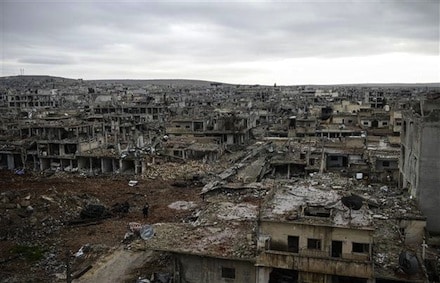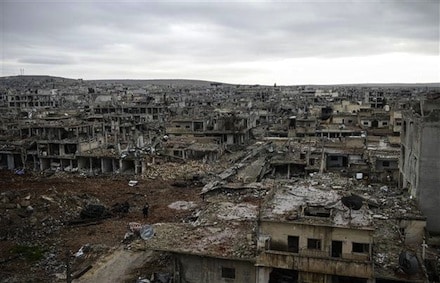
In the aftermath of the US withdrawal from Afghanistan, some interventionists are ignoring the most important factor in the Afghanistan debacle: what motivated the terrorists to commit the 9/11 attacks.
Or, even worse, some interventionists continue to buy into the motive that US officials ascribed immediately after the attacks: that the terrorists struck on 9/11 because they hated America for its “freedom and values” or because they were Muslims who were engaged in a centuries-old quest to establish a worldwide Islamic caliphate, one that would put the United States under Sharia law.
The real motive for the 9/11 attacks was the deep anger and rage arising from the deadly, destructive, and humiliating US interventionism in the Middle East after the end of the Cold War.
Why is that important?
For two reasons.
First, if the pre-9/11 interventionism had never taken place, there never would have been the 9/11 attacks, which in turn means that there never would have been the post-9/11 invasions of Afghanistan and Iraq.
Second, the invasions and occupations of Afghanistan and Iraq continued the deadly, destructive, and humiliating interventionism that produced the 9/11 attacks in the first place.
America’s national-security state
A short review of history is necessary.
The United States started out as a limited-government republic. That’s a type of governmental system in which the federal government’s powers were limited to the powers enumerated in the Constitution. The last thing the Framers wanted was a government of omnipotent powers.
After the end of World War II, that limited-government system was abandoned in favor of a governmental system known as a national-security state. Under this type of governmental system, the government’s powers became omnipotent. These included the powers of assassination, torture, coups, foreign interventionism, secret mass surveillance, alliances with dictatorial regimes, regime-change operations, and more.
National-security states depend on official enemies or a constant environment of crises to keep the citizenry riled up and afraid. In that way, people are willing — even eager — to keep the national-security establishment in existence and also to expand its power, influence, and tax-funded largess.
The US national-security establishment’s official enemy was the Soviet Union and “godless communism.” That was what the Cold War was all about. Americans were made to believe that there was an international communist conspiracy to take over the world that was supposedly based in Moscow, Russia. Throughout the Cold War era, the Pentagon, the CIA, and the NSA—i.e., the three principal components of the national-security state — grew in power, influence, and tax-funded largess.
A new official enemy
When the Cold War suddenly and unexpectedly ended in 1989, the US national-security establishment needed a new official enemy to replace the Soviet Union and “godless communism.” That new official enemy became terrorism.
But in order to make sure that terrorism was frightening as communism, terrorist attacks were needed to scare people. That’s where foreign interventionism came into play. By killing, impoverishing, and humiliating countless people in the Middle East after losing its official Cold War enemy, US officials were able to generate terrorist retaliation against the United States that was then used to rile up and incite fear within the American people.
For example, there was the 1993 attack on the World Trade Center, which was, in principle, no different from the 9/11 attacks eight years later. The earlier attack didn’t generate the same anger and fear that the 9/11 attacks generated because there wasn’t the massive destruction and loss of life that came with the 9/11 attacks.
But there is something important to note:: When one of the 1993 terrorists, Ramzi Yousef, was brought to justice for his role in the 1993 attack on the WTC, he angrily told the federal judge at his sentencing hearing that the reason he had acted was to retaliate for the death and suffering that the US government was inflicting in the Middle East, especially with its sanctions on Iraq, which were contributing to the deaths of thousands of Iraqi children, not to mention throwing multitudes of Iraqi citizens into poverty. He never cited hated for America’s “freedom and values” or any desire to establish a worldwide Islamic caliphate.
Then there were the terrorist attacks on the USS Cole and the US embassies in East Africa. There was also Osama bin Laden’s declaration of war against the United States in which he cited the US stationing of troops in Saudi Arabia as part of his motivation.
A foreign policy of non-interventionism
Now, imagine if all that post-Cold War interventionism had not occurred. There never would have been the pre-9/11 terrorist attacks. More important, there wouldn’t have been the 9/11 attacks. We would never have had the “Global War on Terror,” the USA PATRIOT Act, the illegal telecom scandal, the torture and prison center at Gitmo, the expansion of the state-sponsored assassination program, the intrusive pat-down searches at airports, the mass secret surveillance, and all the other things that have come as a result of the 9/11 attacks. We would never have had the invasions and occupations of Afghanistan and Iraq.
Today, there are many interventionists who are arguing that the only problem with the Afghanistan debacle is that US officials mismanaged the occupation. They are claiming that it was right for the US government to invade Afghanistan in the first place to retaliate for the 9/11 attacks but that it just should’t have engaged in “nation-building.”
In the process, what these interventionists are unfortunately doing is the same thing they did twenty years ago — they are totally ignoring the motive that went into the 9/11 attacks or, even worse, they are still buying into the official and false motives ascribed by US officials — that the terrorists just hated us for our “freedom and values” or that they were participating in a centuries-old question to establish an Islamic caliphate.
Today, interventionists are advocating a foreign police that entails“smart” or “prudent” interventionism. By ignoring motive or by getting motive wrong, what they don’t realize is that even “smart” or “prudent” interventionism will continue to incite anti-American terrorism, which will then produce more anti-terrorist retaliation. In other words, if Americans adopt a foreign policy paradigm of “smart” or “prudent’ interventionism, the national-security establishment’s post-Cold War “war on terrorism” racquet will continue.
By focusing on the real motive behind the 9/11 attacks — interventionism — we are able to see the importance of rejecting interventionism entirely, including “smart” or “prudent” interventions. That will enable us to get back on the road toward a free, peaceful, prosperous, and harmonious society.
Reprinted with permission from Future of Freedom Foundation.

